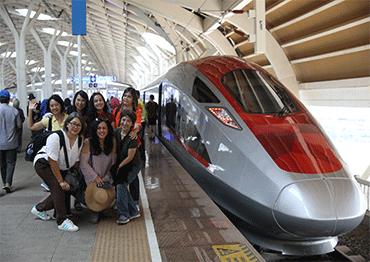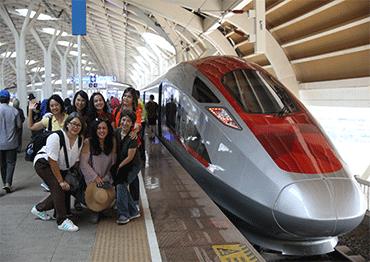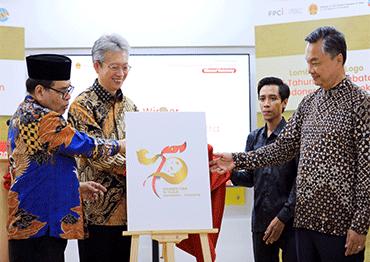ith the launch of the Jakarta-Bandung High-Speed Railway in late 2023, a landmark project under the Belt and Road Initiative, cooperation between China and Indonesia, Southeast Asia’s most populous nation, has significantly deepened. As the two countries prepare to celebrate 75 years of diplomatic relations in 2025, both are working to usher in a new era of collaboration, said Wang Lutong, China’s Ambassador to Indonesia.
In an exclusive interview with NewsChina, Wang shared his experience riding the Jakarta-Bandung High-Speed Railway, revealing that future priorities will center on high-quality Belt and Road collaboration aligned with Indonesia’s development agenda.
This will focus on “more livelihood-enhancing projects and people-connecting initiatives that bring tangible benefits to citizens of both nations,” the ambassador said.
Wang offered insights into the future of China-Indonesia ties and the broader significance of their partnership in shaping a more equitable global order. He emphasized that strengthening bilateral ties is not only essential for the well-being of their nearly two billion combined population, but also critical to advancing cooperation among the Global South in an increasingly volatile international landscape.
NewsChina: Shortly after your appointment, you took a ride on the Jakarta-Bandung High-Speed Railway (JB HSR, locally known as Whoosh). What were your impressions of the journey?
Wang Lutong: I assumed my position in Indonesia in October 2024, and the one-year anniversary celebration of the JB HSR’s official operation was the first major event I attended after taking office. Following the inauguration ceremony for Karawang Station in late December 2024, the last station to open, I made a special trip to ride the train, visiting all four stations along the route to gain a deeper understanding of station operations and surrounding infrastructure development.
I had three distinct impressions. First, the JB HSR carries a strong Chinese imprint. A Chinese passenger would feel instantly at home, from the platform design and cabin furnishings to the seamless travel experience, it mirrors riding a high-speed train in China.
Second, the JB HSR delivers impressive speed and efficiency. Operating at 350 km/h, in line with China’s high-speed rail standards, it ranks among the fastest in the world. The transformative impact of this modern transportation system on Indonesia’s connectivity is remarkable, and it highlights the excellence and reliability of Chinese high-speed rail technology.
Third, the JB HSR is becoming increasingly lively. During my visits, I saw many Indonesian passengers, office commuters and families traveling together. The stations were bustling, with shops lining the surrounding areas. Since its launch in October 2023, ridership has steadily grown, with daily passenger numbers peaking at over 24,000. The high-speed rail is on track to become a part of daily life for many Indonesians.
NC: Do you think the success of this project has influenced perceptions of China-Indonesia cooperation among the Indonesian public and business community?
WL: Absolutely. The JB HSR is a golden calling card for China-Indonesia collaboration. Its timely completion and continued safe, efficient operations have strengthened the Indonesian public’s trust in Chinese technology, products and engineering capabilities.
Over 75 percent of the services and procurement for the JB HSR project were sourced locally in Indonesia, creating 30,000 jobs and significantly boosting the country’s economic and social development. The project also trained a large number of local employees, enhancing their professional skills, with many Indonesians directly benefiting.
Moreover, during the construction and operation of the JB HSR, China and Indonesia worked closely to overcome numerous challenges, including the pandemic. The Chinese government, enterprises and financial institutions demonstrated a strong sense of responsibility throughout, further deepening mutual trust and friendship between our two countries.
In sum, the railway not only promotes local development in Indonesia, but also strengthens the economic ties between the two nations. It has fostered greater mutual understanding between our societies, laying a solid foundation for deeper bilateral cooperation.
NC: What other tangible benefits has the high-speed railway brought to Indonesia?
WL: As Southeast Asia’s first high-speed railway, the JB HSR’s greatest significance is that it truly belongs to the Indonesian people and benefits the public at large.
Since opening, the travel time between Jakarta and Bandung has been cut from over three hours to just 40 minutes, easing traffic congestion and providing locals with a fast, convenient transportation option. It has spurred commercial development and tourism along the route, accelerating the formation of a high-speed rail economic corridor.
Official Indonesian statistics show that, by using electricity, the JB HSR saves nearly US$200 million in fuel costs annually. During its construction between 2019 and 2023, the project contributed nearly US$6 billion to the GDP of Jakarta and West Java.
The JB HSR’s success has seen “made in China” become synonymous with quality and innovation in Indonesia, winning the trust and preference of Indonesian stakeholders. Beyond giving Chinese companies a competitive edge in both global expansion and the Indonesian market, the project has attracted significant international attention. Numerous foreign diplomats and delegations have conducted study visits to learn from this exemplary model of China-Indonesia cooperation.
It’s fair to say that the JB HSR has become a tangible bridge for China-Indonesia exchange and collaboration, driving the further development of bilateral relations.
NC: We’ve seen growing interest from Chinese companies about investing in Indonesia. How do you view this trend?
WL: China is an important source of foreign investment for Indonesia. According to ffgures released by Indonesian authorities, companies from the Chinese mainland invested US$8.1 billion in Indonesia in 2024, making it the third-largest investor after Singapore and China’s Hong Kong SAR. Chinese investment spans a wide range of sectors, from infrastructure, manufacturing and industrial parks to energy and mining, agriculture, fisheries and finance. Alongside major landmark projects, we’re also seeing a number of “small but beautiful” initiatives take root.
In November 2024, China and Indonesia issued a joint statement pledging to build a new framework for comprehensive development cooperation, which signals broad prospects for deepening investment collaboration.
Indonesia, with its young population and fast-growing digital economy, offers huge consumption potential. However, infrastructure and logistics still need improvement. Compared with the Chinese market, Indonesia’s e-commerce platforms rely more on social media for marketing, and small- and medium-sized enterprises dominate the landscape. Building brand recognition here takes time. Also, the market access system and regulatory compliance requirements can be quite complex for foreign investors.
Therefore, Chinese investors must make great efforts in localization and risk control in their Indonesia operations, especially through proper market research and regulation compliance. Companies should fulfill their corporate social responsibility to integrate with local communities for win-win development, for example, by contributing to community building, disaster relief, education and support people in need.
NC: During Indonesian President Prabowo Subianto’s state visit to China in 2024, the two heads of state agreed to deepen cooperation based on five pillars: political, economic, cultural, maritime and security. What’s the significance of this?
WL: During President Prabowo’s visit, the two sides reached a significant consensus on the future of bilateral ties. They agreed to upgrade from the original “four-pillar drive” framework to a “five-pillar” cooperation model by adding security as a new dimension. This marks a deepening of bilateral ties and reflects the growing strategic mutual trust between the two countries.
The inclusion of security cooperation responds to changes in the regional and global landscape. As large developing countries and emerging economies, China and Indonesia both face traditional and non-traditional security challenges, ranging from transnational crime and terrorism to cybersecurity and maritime security. Strengthening cooperation in these areas will help us jointly maintain regional peace and stability, providing a more secure environment for development.
This upgrade marks a new stage in the China-Indonesia comprehensive strategic partnership. It makes our cooperation more comprehensive and balanced. Political trust provides a firm foundation, economic collaboration drives shared development, cultural exchanges strengthen people-to-people ties, maritime cooperation deepens our “blue partnership,” and the addition of security enhances our strategic coordination.
NC: As China and Indonesia mark the 75th anniversary of diplomatic ties in 2025, what key lessons can be drawn from their journey?
WL: Over the past 75 years, China-Indonesia relations have maintained healthy development, gaining valuable experiences that warrant careful reflection and consolidation.
First, head-of-state diplomacy has provided essential strategic guidance. Over the past decade, presidents of our two countries have exchanged visits and held more than 10 meetings and phone calls. Their leadership has offered strong political support and clear direction for the relationship.
Second, win-win cooperation has been the main engine driving our ties. The Jakarta-Bandung High-Speed Railway has served over eight million passengers. In 2024, bilateral trade reached US$147.8 billion, a 6.1 percent increase year-on-year, with China remaining Indonesia’s largest trading partner for the 12th consecutive year. The recent upgrade of the Batang Industrial Park into a special economic zone is injecting fresh momentum into the “Two Countries, Twin Parks” initiative.
Third, people-to-people exchanges have played a vital role in fostering mutual understanding. In 2024, 1.44 million Chinese tourists visited Indonesia. Traditional music ensembles and Xinjiang art troupes from China performed in Indonesia, while high-level Indonesian religious delegations visited China multiple times, deepening friendship and mutual appreciation.
Fourth, the two countries have worked together to uphold fairness and justice in global affairs. In 2022 and 2023, Indonesia successfully hosted the G20 Summit and East Asia Cooperation Leaders’ Meetings, with China offering strong support. As influential developing nations, China and Indonesia jointly champion Asian values – peace, cooperation, inclusiveness and integration, and work hand-in-hand with the Global South to safeguard shared interests.
As we mark the 75th anniversary of diplomatic relations, China and Indonesia are looking to the future.
First, we’ll maintain close high-level exchanges and strengthen strategic communication to further build political trust.
Second, we’ll uphold principles of strategic autonomy and sovereign equality, aligning Chinese modernization with Indonesia’s “Golden Indonesia 2045” vision and deepening high-quality Belt and Road cooperation.
Third, we’ll continue to foster people-to-people exchanges and strengthen the social foundations of our partnership. And fourth, we’ll work together to safeguard regional peace and stability, building the “Five Homes,” marked by peace, tranquility, prosperity, beauty and friendship.
NC: This year also marks the 70th anniversary of the 1955 Bandung Conference held in Indonesia. What relevance does it hold today?
WL: The world today is undergoing profound changes, with the rise of the “Global South” pushing the international order toward greater balance and equity. Against this backdrop, revisiting the spirit and historical significance of the 1955 Bandung Conference offers valuable insight.
The Bandung Conference was a milestone in Global South unity and cooperation. It championed the Five Principles of Peaceful Coexistence and the “Bandung Spirit,” promoted the democratization of international relations, and laid a foundation for today’s South-South cooperation. Its emphasis on independence, self-determination and non-interference in internal affairs remains highly relevant in today’s global pursuit of fairness and justice.
In the face of unilateralism and challenges to global governance, China continues to advocate for genuine multilateralism. We firmly support the UN-centered international system, the international order based on international law, and the fundamental norms of international relations grounded in the UN Charter. China also supports a stronger voice for Global South countries in international affairs and is committed to guiding global governance in a more just and equitable direction.
NC: Indonesia recently joined BRICS. How might this influence its development and bilateral cooperation with China?
WL: The BRICS mechanism serves as a crucial platform for fostering solidarity among the Global South and advancing the reform of global governance. Indonesia’s joining BRICS this year has further enhanced the group’s representativeness and strengthened the collective force of the Global South in solidarity and cooperation.
This development will serve as a springboard for both nations to deepen comprehensive, multi-tiered collaboration, bringing fresh momentum to regional peace and prosperity.
This development will serve as a springboard for both nations to deepen comprehensive, multi-tiered collaboration, bringing fresh momentum to regional peace and prosperity.
Notably, President Prabowo Subianto recently announced Indonesia’s intention to join the New Development Bank, which would allow Indonesia to secure funding for domestic projects and inject new growth momentum into its economy.
Within the BRICS framework, Indonesia can also be engaged in cooperation on various fields, such as trade and finance, AI, healthcare and green development.
China and Indonesia are good neighbors and partners. With Indonesia’s entry into BRICS as a new opportunity, the two sides will further deepen all-round, multi-level cooperation, jointly contributing more positive energy and momentum to regional peace and prosperity.
NC: There still seems to be a lack of mutual understanding, and even some prejudice, between the peoples of the two countries. In your view, what should be done to improve this situation? Will there be concrete measures to expand people-to-people exchanges?
WL: Both sides will take concrete steps to expand people-to-people exchanges, including improving visa facilitation, increasing direct flights, promoting educational and cultural exchanges, enhancing tourism cooperation and deepening economic and trade interactions.
China and Indonesia both have long histories and rich cultures, and the friendship between our peoples runs deep. However, due to language barriers, geographical distance and limited access to information, there are still gaps in mutual understanding.
To address this, both countries have expanded cooperation in recent years through initiatives such as Confucius Institutes, scholarship programs and Chinese language education. Looking forward, we will continue to grow these efforts, especially through scholarships and student exchanges, so more young people can become ambassadors of China-Indonesia friendship.
Economic, tourism and local-level exchanges are also vital for fostering emotional connection. Tourism and local exchanges bring emotional connections in a more intuitive way – more and more Chinese tourists are visiting Indonesia, and we hope to welcome more Indonesian friends to China to experience our diverse culture and rapid development.

 Old Version
Old Version

